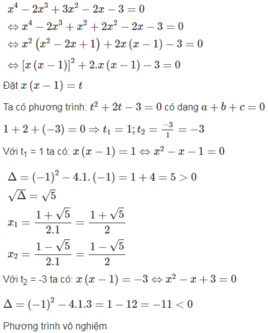Giải phương trình: x3 + (x-2)3 = (2x-2)3

Những câu hỏi liên quan
Giải các phương trình sau:a)
x
x
−
3
+
2
x
−
3
0
;b)
x
2
x
−
1
−
x
2
x
+
2
+
x...
Đọc tiếp
Giải các phương trình sau:
a) x x − 3 + 2 x − 3 = 0 ;
b) x 2 x − 1 − x 2 x + 2 + x 3 − x + 3 = 0
a) Biến đổi về dạng (x - 3)(x + 2) = 0. Tìm được x ∈ { - 2 ; 3 }
b) Thu gọn về dạng -2x + 3 = 0. Tìm được x = 3 2
Đúng 0
Bình luận (0)
\(\text{Giải phương trình: x3 + (x-2)3 = (2x-2)3}\)
Bài 1: Giải các phương trình dưới đây1) x2 - 9 (x - 3)(5x +2)2) x3 - 1 (x - 1)(x2 - 2x +16)3) 4x2 (x - 1) - x + 1 04) x3 + 4x2 - 9x - 36 05) (3x + 5)2 (x - 1)26) 9 (2x + 1)2 4 (x - 5)27) x2 + 2x 158) x4 + 5x3 + 4x2 09) (x2 - 4) - (x - 2)(3 - 2x) 010) (3x + 2)(x2 - 1) (9x2 - 4) (x + 1)11) (3x - 1)(x2 + 2) (3x - 1)(7x - 10)12) (2x2 + 1) (4x - 3) (x - 12)(2x2 + 1)
Đọc tiếp
Bài 1: Giải các phương trình dưới đây
1) x2 - 9 = (x - 3)(5x +2)
2) x3 - 1 = (x - 1)(x2 - 2x +16)
3) 4x2 (x - 1) - x + 1 = 0
4) x3 + 4x2 - 9x - 36 = 0
5) (3x + 5)2 = (x - 1)2
6) 9 (2x + 1)2 = 4 (x - 5)2
7) x2 + 2x = 15
8) x4 + 5x3 + 4x2 = 0
9) (x2 - 4) - (x - 2)(3 - 2x) = 0
10) (3x + 2)(x2 - 1) = (9x2 - 4) (x + 1)
11) (3x - 1)(x2 + 2) = (3x - 1)(7x - 10)
12) (2x2 + 1) (4x - 3) = (x - 12)(2x2 + 1)
1: \(\Leftrightarrow\left(x-3\right)\left(x+3\right)-\left(x-3\right)\left(5x+2\right)=0\)
\(\Leftrightarrow\left(x-3\right)\left(-4x+1\right)=0\)
hay \(x\in\left\{3;\dfrac{1}{4}\right\}\)
2: \(\Leftrightarrow\left(x-1\right)\left(x^2+x+1\right)-\left(x-1\right)\left(x^2-2x+16\right)=0\)
\(\Leftrightarrow\left(x-1\right)\left(x^2+x+1-x^2+2x-16\right)=0\)
\(\Leftrightarrow\left(x-1\right)\left(3x-15\right)=0\)
hay \(x\in\left\{1;5\right\}\)
3: \(\Leftrightarrow\left(x-1\right)\left(4x^2-1\right)=0\)
\(\Leftrightarrow\left(x-1\right)\left(2x-1\right)\left(2x+1\right)=0\)
hay \(x\in\left\{1;\dfrac{1}{2};-\dfrac{1}{2}\right\}\)
4: \(\Leftrightarrow x^2\left(x+4\right)-9\left(x+4\right)=0\)
\(\Leftrightarrow\left(x+4\right)\left(x-3\right)\left(x+3\right)=0\)
hay \(x\in\left\{-4;3;-3\right\}\)
5: \(\Leftrightarrow\left[{}\begin{matrix}3x+5=x-1\\3x+5=1-x\end{matrix}\right.\Leftrightarrow\left[{}\begin{matrix}2x=-6\\4x=-4\end{matrix}\right.\Leftrightarrow\left[{}\begin{matrix}x=-3\\x=-1\end{matrix}\right.\)
6: \(\Leftrightarrow\left(6x+3\right)^2-\left(2x-10\right)^2=0\)
\(\Leftrightarrow\left(6x+3-2x+10\right)\left(6x+3+2x-10\right)=0\)
\(\Leftrightarrow\left(4x+13\right)\left(8x-7\right)=0\)
hay \(x\in\left\{-\dfrac{13}{4};\dfrac{7}{8}\right\}\)
Đúng 1
Bình luận (0)
1.
\(\Leftrightarrow\left(x-3\right)\left(x+3\right)=\left(x-3\right)\left(5x-2\right)\)
\(\Leftrightarrow x+3=5x-2\)
\(\Leftrightarrow4x=5\Leftrightarrow x=\dfrac{5}{4}\)
2.
\(\Leftrightarrow\left(x-1\right)\left(x^2+x+1\right)=\left(x-1\right)\left(x^2-2x+16\right)\)
\(\Leftrightarrow x^2+x+1=x^2-2x+16\)
\(\Leftrightarrow3x=15\Leftrightarrow x=5\)
3.
\(\Leftrightarrow4x^2\left(x-1\right)-\left(x-1\right)=0\)
\(\Leftrightarrow\left(x-1\right)\left(4x^2-1\right)=0\)
\(\Leftrightarrow\left[{}\begin{matrix}x=1\\x=\dfrac{1}{2};x=-\dfrac{1}{2}\end{matrix}\right.\)
Đúng 1
Bình luận (1)
7.
\(\Leftrightarrow x^2+2x-15=0\)
\(\Leftrightarrow\left(x-3\right)\left(x+5\right)=0\)
\(\Leftrightarrow\left[{}\begin{matrix}x=3\\x=-5\end{matrix}\right.\)
8.\(\Leftrightarrow x^4+x^3+4x^3+4x^2=0\)
\(\Leftrightarrow x^3\left(x+1\right)+4x^2\left(x+1\right)=0\)
\(\Leftrightarrow\left(x+1\right)\left(x^3+4x^2\right)=0\)
\(\Leftrightarrow\left[{}\begin{matrix}x=-1\\x=0;x=-4\end{matrix}\right.\)
9.\(\Leftrightarrow\left(x-2\right)\left(x+2\right)=\left(x-2\right)\left(3-2x\right)\)
\(\Leftrightarrow x+2=3-2x\)
\(\Leftrightarrow3x=1\Leftrightarrow x=\dfrac{1}{3}\)
Đúng 1
Bình luận (0)
Xem thêm câu trả lời
Giải các phương trình: x 4 - 2 x 3 + 3 x 2 - 2x + 3 = 0
Bài 5: Tìm x (Giải phương trinh)
a)x^3-13x=0
b) 5x(x – 2000) – x + 2000 = 0
c) 2x(x – 2) + 3(x – 2) = 0
d) x + 1 = (x + 1)2
e) x + 5x2 = 0
f) x3 + x = 0
Bài 5: Tìm x (Giải phương trình)
a)x^3-13x=0 b) 5x(x – 2000) – x + 2000 = 0
c) 2x(x – 2) + 3(x – 2) = 0 d) x + 5x2 = 0
d) x + 1 = (x + 1)2 e) x3 + x = 0
b) 5x(x-2000)-x+2000=0
\(\Rightarrow5x\left(x-2000\right)-\left(x-2000\right)=0\\ \Rightarrow\left(x-2000\right)\left(5x-1\right)=0\)
\(\Rightarrow\left\{{}\begin{matrix}x-2000=0\\5x-1=0\end{matrix}\right.\Leftrightarrow\left\{{}\begin{matrix}x=0+2000\\5x=0+1\end{matrix}\right.\Leftrightarrow\left\{{}\begin{matrix}x=2000\\5x=1\end{matrix}\right.\Leftrightarrow\left\{{}\begin{matrix}x=2000\\x=\dfrac{1}{5}\end{matrix}\right.\)
Đúng 1
Bình luận (0)
c) Ta có: \(2x\left(x-2\right)+3\left(x-2\right)=0\)
\(\Leftrightarrow\left(x-2\right)\left(2x+3\right)=0\)
\(\Leftrightarrow\left[{}\begin{matrix}x=2\\x=\dfrac{-3}{2}\end{matrix}\right.\)
d) Ta có: \(5x^2+x=0\)
\(\Leftrightarrow x\left(5x+1\right)=0\)
\(\Leftrightarrow\left[{}\begin{matrix}x=0\\x=\dfrac{-1}{5}\end{matrix}\right.\)
Đúng 0
Bình luận (0)
Bài 5: Giải các phương trình sau:a. (3x - 1)2 - (x + 3)2 0b. x3 dfrac{x}{49}c. x2 - 7x + 12 0d. 4x2 - 3x -1 0e. x3 - 2x - 4 0f. x3 + 8x2 + 17x +10 0g. x3 + 3x2 + 6x + 4 0h. x3 - 11x2 + 30x 0
Đọc tiếp
Bài 5: Giải các phương trình sau:
a. (3x - 1)2 - (x + 3)2 = 0
b. x3 = \(\dfrac{x}{49}\)
c. x2 - 7x + 12 = 0
d. 4x2 - 3x -1 = 0
e. x3 - 2x - 4 = 0
f. x3 + 8x2 + 17x +10 = 0
g. x3 + 3x2 + 6x + 4 = 0
h. x3 - 11x2 + 30x = 0
a. (3x - 1)2 - (x + 3)2 = 0
\(\Leftrightarrow\left(3x-1+x+3\right)\left(3x-1-x-3\right)=0\)
\(\Leftrightarrow\left(4x+2\right)\left(2x-4\right)=0\)
\(\Leftrightarrow4x+2=0\) hoặc \(2x-4=0\)
1. \(4x+2=0\Leftrightarrow4x=-2\Leftrightarrow x=-\dfrac{1}{2}\)
2. \(2x-4=0\Leftrightarrow2x=4\Leftrightarrow x=2\)
S=\(\left\{-\dfrac{1}{2};2\right\}\)
Đúng 3
Bình luận (0)
b. \(x^3=\dfrac{x}{49}\)
\(\Leftrightarrow49x^3=x\)
\(\Leftrightarrow49x^3-x=0\)
\(\Leftrightarrow x\left(49x^2-1\right)=0\)
\(\Leftrightarrow x\left(7x+1\right)\left(7x-1\right)=0\)
\(\Leftrightarrow x=0\) hoặc \(7x+1=0\) hoặc \(7x-1=0\)
1. x=0
2. \(7x+1=0\Leftrightarrow7x=-1\Leftrightarrow x=-\dfrac{1}{7}\)
3. \(7x-1=0\Leftrightarrow7x=1\Leftrightarrow x=\dfrac{1}{7}\)
Đúng 2
Bình luận (0)
*Cách khác:
a) Ta có: \(\left(3x-1\right)^2-\left(x+3\right)^2=0\)
\(\Leftrightarrow\left(3x-1\right)^2=\left(x+3\right)^2\)
\(\Leftrightarrow\left[{}\begin{matrix}3x-1=-x-3\\3x-1=x+3\end{matrix}\right.\Leftrightarrow\left[{}\begin{matrix}4x=-2\\2x=4\end{matrix}\right.\Leftrightarrow\left[{}\begin{matrix}x=-\dfrac{1}{2}\\x=2\end{matrix}\right.\)
Vậy: \(S=\left\{-\dfrac{1}{2};2\right\}\)
Đúng 2
Bình luận (0)
Xem thêm câu trả lời
Giải phương trình
a) 1 phần x-1 - 3x2 phần x3+1 = 2x phần x2+x+1
b) x phần 3 + x = x phần 6 + 2x+1 phần 2
a:
Sửa đề: \(\dfrac{1}{x-1}-\dfrac{3x^2}{x^3-1}=\dfrac{2x}{x^2+x+1}\)
=>x^2+x+1-3x^2=2x(x-1)
=>-2x^2+x+1-2x^2+2x=0
=>-4x^2+3x+1=0
=>4x^2-3x-1=0
=>4x^2-4x+x-1=0
=>(x-1)(4x+1)=0
=>x=1(loại) hoặc x=-1/4(nhận)
b: =>2x+6x=x+3(2x+1)
=>x+6x+3=8x
=>7x+3=8x
=>-x=-3
=>x=3(nhận)
Đúng 0
Bình luận (0)
Giải các phương trình sau:a)
2
x
−
1
3
+
6
3
x
−
1
2
2
x
+
1
3
+
6...
Đọc tiếp
Giải các phương trình sau:
a) 2 x − 1 3 + 6 3 x − 1 2 = 2 x + 1 3 + 6 x + 2 3 ;
b) x − 2 2 + 3 − 2 x 2 − 4 x − 4 x − 5 = x + 3 2 ;
c) x − 3 + 2 x − 3 − 1 3 = 3 − x 4 ;
d) x + 4 3 − 1 7 = 2 − x 7 + x 3 + x + 1 .
Giải các phương trình sau:
i, (2x-1)2+(2-x)(2x-1)=0 j, (x-1)(5x+3)=(3x-5)(x-1) k, (4x+20)(x-6)=0 m, x3+x2+x+1=0 |
i,<=>(2x - 1)(2x - 1 + 2 - x) = 0 <=> (2x - 1)(x + 1) = 0
<=> x = 1/2 hoặc x = -1
j,<=>(x - 1)(5x + 3) - (3x - 5)(x - 1) = 0
<=>(x - 1)(2x + 8) = 0 <=> x = 1 hoặc x = -4
k,<=>4(x + 5)(x - 6) = 0 <=> (x + 5)(x - 6) = 0
<=> x = -5 hoặc x = 6
m,<=>x^2(x + 1) + x + 1 = 0
<=>(x^2 + 1)(x + 1) = 0 (1)
Mà x^2 + 1 > 0 với mọi x nên (1) xảy ra <=> x + 1 = 0
<=> x = -1
Đúng 1
Bình luận (0)
giải các phương trình sau:
a) (2x-3)2=(x+1)2
b) x2-6x+9=9(x-1)2
c) x2+2x=(x-2)3x
d) x3+x2-x-1=0
e) (x+1)(x+2)(x+4)(x+5)=40
\(a,\left(2x-3\right)^2=\left(x+1\right)^2\\ \Leftrightarrow\left(2x-3\right)^2-\left(x+1\right)^2=0\\ \Leftrightarrow\left(2x-3+x+1\right)\left(2x-3-x-1\right)=0\\ \Leftrightarrow\left(3x-2\right)\left(x-4\right)\\ \Leftrightarrow\left[{}\begin{matrix}3x-2=0\\x-4=0\end{matrix}\right.\\ \Leftrightarrow\left[{}\begin{matrix}3x=2\\x=4\end{matrix}\right. \\ \Leftrightarrow\left[{}\begin{matrix}x=\dfrac{2}{3}\\x=4\end{matrix}\right.\)
Vậy \(x\in\left\{\dfrac{2}{3};4\right\}\)
Đúng 0
Bình luận (0)
\(b,x^2-6x+9=9\left(x-1\right)^2\\ \Leftrightarrow\left(x-3\right)^2=9\left(x-1\right)^2\\ \Leftrightarrow\left(x-3\right)^2-9\left(x-1\right)^2=0\\ \Leftrightarrow\left(x-3\right)^2-3^2\left(x-1\right)^2=0\\ \Leftrightarrow\left(x-3\right)^2-\left[3\left(x-1\right)\right]^2=0\\ \Leftrightarrow\left(x-3\right)^2-\left(3x-3\right)^2=0\\ \Leftrightarrow\left(x-3+3x-3\right)\left(x-3-3x+3\right)=0\\ \Leftrightarrow-2x\left(4x-6\right)=0\\ \Leftrightarrow\left[{}\begin{matrix}-2x=0\\4x-6=0\end{matrix}\right.\\ \Leftrightarrow\left[{}\begin{matrix}x=0\\4x=6\end{matrix}\right.\\ \Leftrightarrow\left[{}\begin{matrix}x=0\\x=\dfrac{3}{2}\end{matrix}\right.\)
Vậy \(x\in\left\{0;\dfrac{3}{2}\right\}\)
Đúng 0
Bình luận (0)
























